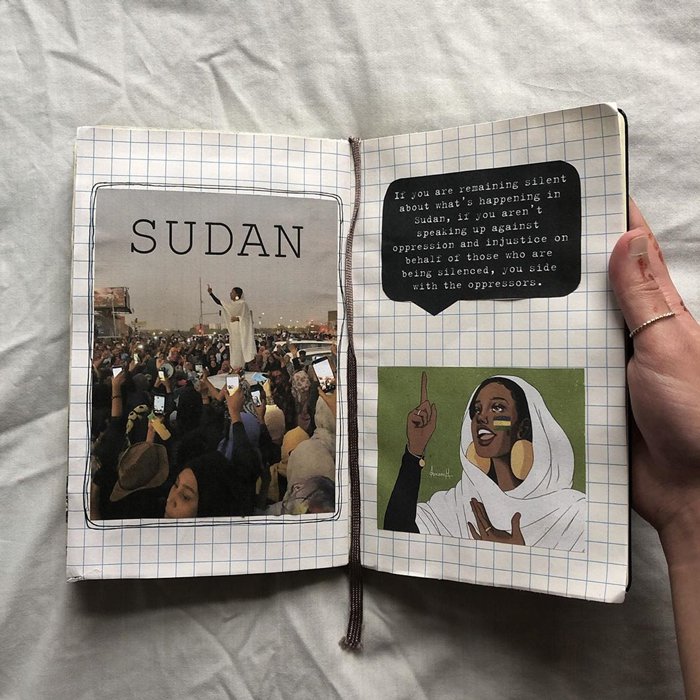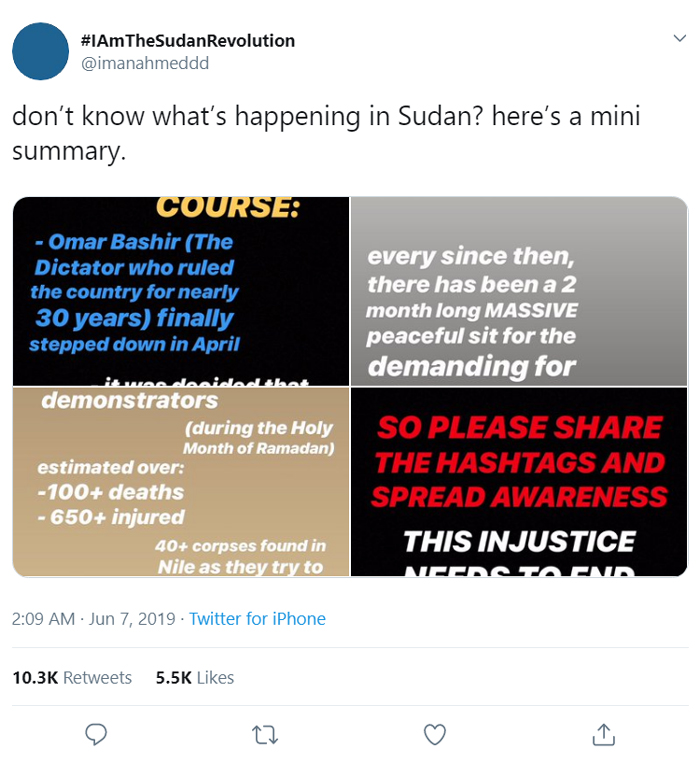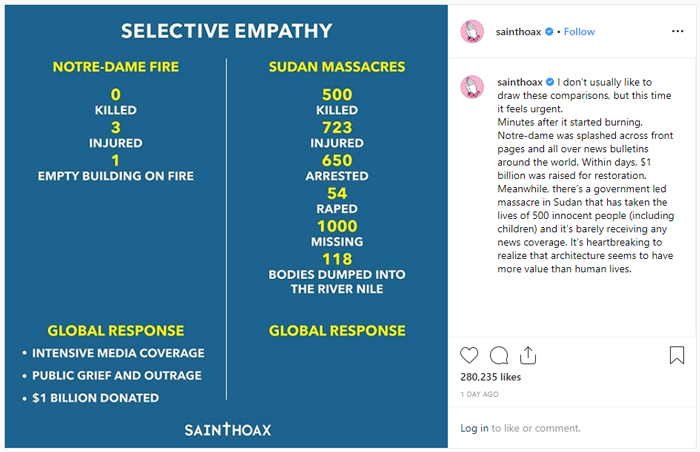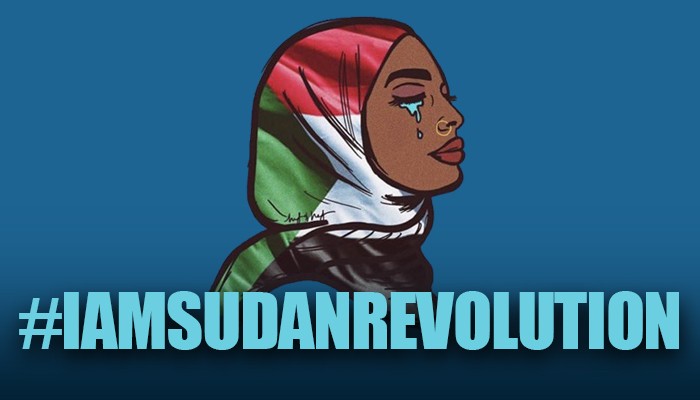Sudanese people are stuck and have no way of reaching out to the world.
The government, taken over by the Sudanese army in a coup after the ouster of former president Omar al-Bashir, has imposed a blanket ban on the Internet in an attempt to suppress a protest, effectively cutting off local folks and activists from telling the world the horrors the authorities are perpetrating.
On June 3, just before Eid-ul-Fitr, at least 118 protesters were killed, as per the Opposition, and paramilitary militias — the Rapid Support Forces, alternatively known as Janjaweed — and representatives of the authorities raped dozens of women in what has now come to be known as the ghastly Khartoum Massacre.
Hundreds upon hundreds of protesters had descended into the Sudanese capital to join a sit-in outside the military's headquarters before the Khartoum Massacre to demand the army give up control and hand it over to a civilian government.
The Sudanese authorities, as well as the Transitional Military Council (TMC), had vastly under-reported the aggression at Khartoum Massacre — something eerily reminiscent of the 2012-13 Egyptian protests — and put the figure at 62.

Geo.tv spoke to activists on the ground, as well as information facilitators, to understand and explain unreported extrajudicial killings, rape, sexual violence, beating, and assault allegedly at the hands of the Sudanese security forces, army, and the paramilitary personnel, who are also collectively harassing striking workers by threatening their livelihoods and lives.
A student at the University of Khartoum, Lina, while speaking to Geo.tv over phone, said Sudan has four telecom companies that offer Internet services, of which "3 are completely shut down and the fourth one (Sudatel) does work but [its] landline internet exclusively because banks, embassies and other vital institutions use it".
Lina said reporting and news from inside Sudan — and especially its capital, Khartoum — was very limited because a small number of people had the privilege of using that network. "The source of information right now online comes from the people who have access to that network which are very few.
"Other people communicate what's going on by sending SMS to their friends outside Sudan and they post/tweet it on their behalf," she said.
Activist Dallia Abdelmoniem spoke of the Khartoum Massacre and explained to Geo.tv that "more than a 100 civilians were killed by militias associated by the military council [and there were] cases of rape and the dumping of bodies in the River Nile".
Abdelmoniem said the country just came out of a three-day civil disobedience that was called for and organised by the Declaration of Freedom and Change Forces (DFCF) wherein "banks, public transport, businesses, shops, companies, newspapers, pharmacies" were shuttered down. The strike, she added, was a response to the Khartoum Massacre against peaceful protesters.
"There were reports state employees such as those in the civil aviation were forced at gunpoint to go back to work," the activist mentioned. In fact, "the head of the central bank and the head of the air space union were arrested for agreeing to go on strike."
In a statement issued June 5, 2019, the Sudanese Professionals Association (SPA) had called for complete civil disobedience and open political strike.
It highlighted: "Khartoum and other cities in Sudan have witnessed a good sample of life under the rule of the coup council: mass murders and extrajudicial killings by the army, security forces and paramilitary militias allied with them; pillaging of innocent civilians and their properties; sharp increase of victims of rape, assault and violence; terrorizing and beating people openly in the streets without discretion; forcing striking workers to work under threats on their lives or firing them without any due process".
The SPA also termed the situation “worse than any that came before it in time”, called for everyone "to refrain from recognizing the current ruling junta in Sudan and corner the members of the coup council, who are deep to their knees in the blood of the innocent in Darfur, Nuba Mountains and Blue Nile, in addition to Khartoum and other cities and towns".

Reports circulating on social media indicate as many as 40 bodies were retrieved from the river following the Khartoum Massacre. "Sudanese Civilians are being MASSACRED, SHOT, DROWNED, RAPED by the RSF (Rapid Support Force)," according to Twitter user @imanahmeddd, with her tweet getting shared tens of thousands of times.

Separately, however, pseudonymous Syria-born activist Saint Hoax put the figures much, much higher. According to them, "500 [people have been] killed, 723 injured, 650 arrested, 54 raped, 1000 missing, [and] 118 bodies dumped into the river Nile."
From Reuters on June 7
After the victims of the Khartoum Massacre started pouring into a local hospital, many previous patients there begged to leave in terror, overwhelming doctors.
Some of the militia members, who raided the pro-democracy sit-in, had surrounded Royal Care hospital to hunt protesters taking refuge in the building, deputy director Dr Mohammed Abdel Rahman said.
“People were crying and screaming,” he told Reuters. “They were desperate to leave ... while we were trying to cope with hundreds in serious condition who were arriving.”
The bloodshed dashed hopes that Sudan’s new military rulers - who overthrew veteran leader Omar Hassan al-Bashir on April 11 - would hand over power quickly to civilians.
Shortly after the violence erupted, the hospital declared code black, meaning the 100-bed facility was operating at full capacity. But doctors had no choice.
Three hundred people who were either hit by bullets, beaten with batons, or whipped with long wooden sticks, were in dire need of treatment. Five days later, the hospital still cannot cope.
Exhausted doctors and other staff have no relief – working around the clock because other colleagues cannot make it to Sudan’s biggest private hospital.
There are only 20 physicians. Aside from treating patients, they have taken over nursing and administrative duties and even cleaning floors because there is no one else to do the job.
Six people died from gunshot wounds, two of them before arriving. But the majority are suffering from bone fractures and whippings which leave long scars along their backs.
He said stress levels peaked after the Rapid Support Forces (RSF), which stand accused of genocide in the war against rebels in Darfur, arrived by the hundreds in pick up trucks and formed a cordon around the hospital to search for protesters.
On one hospital ward, victims lay in bed, with metal rods holding together legs and arms shattered by bullets.
A group of five United Nations experts said in a joint statement on Wednesday Sudan was "sliding into a human rights abyss", as per AFP. The signatories include Aristide Nononsi, an activist on human rights in Sudan, Clement Nyaletsossi Voule, the special rapporteur on the right to peaceful assembly, and Agnes Callamard, the rapporteur on extrajudicial or summary executions.
On Thursday, the United Nations's (UN) top official on sexual violence, Pramila Patten, raised concerns over reports that Sudan's militias and RSF gang-raped women protesters and medical personnel during a crackdown on demonstrators and said a monitoring team should be quickly sent to Sudan to "examine the situation on the ground, including alleged cases of sexual violence.
"These include the rapes and gang rapes of protesters, women's human rights defenders and women medical personnel working in hospitals near the sit-in," said Patten's office in a statement.
The Sudanese Doctors Union had last week accused security forces of carrying out attacks on hospitals and raping women near the army headquarters in Khartoum.
It is important to note, however, that many around the world have pointed out that the outrage is not garnering enough attention around the globe because the victims are black, African, and Muslim.
Lina, the university student, said the TMC scheduled a press conference on Thursday — news of which has just made it to media outlets hours earlier today — where they explained: "basically everything started to what happened during their coup on Bashir to what happened on the 3rd of June".
While Lina said Sudanese people believed the press conference to be "just lies", there was "one interesting thing they mentioned is that they were the ones who ordered the 'clean up'" on June 3.
TMC spokesperson Lieutenant General Shams al-Din Kabashi, according to Al-Jazeera, said the army had "ordered the commanders to come up with a plan to disperse this sit-in.
"They made a plan and implemented it ... but we regret that some mistakes happened," Kabashi added.
Lina, however, went on to say the TMC claimed that the clean up "was meant for an area next to the sit-in where some people started selling drugs and doing other illegal activities and their main purpose was to catch those peoples and that they did not intend to end the actual sit-in but some things went wrong during that process which results in the death of those people".
"The area is being called Columbia. Everyone knows about it because it exists for years now, long before the protests or anything front that."
She further commented on how the TMC "is definitely lying [to] used this as an excuse to end the sit-in" and that it "denied the actual number of deaths and said these stats are fabricated".
In the same press conference, Kabashi, regardless, blamed protesters for being a hindrance to any possible resolution, saying: "We insist that the military is the sole guarantor for peace and stability in the transitional phase."
He said there was a "false understanding of a civilian-led government", a jibe at the participants of the sit-in, and said: "In my view, civilian is the authorities, the ruling, the task which we agreed on. After we agreed that government ministers and the legislative council would be civilian-led, they are still screaming civilian, civilian."
"We believe the majority [of the sovereign council] should be military men and the leadership should be the military."
Abdelmoniem, justly, was outraged; she said: "People were burned alive in tents, people were raped, people were killed by the militia and all the TMC can say is what happened?"
"People do not agree with nor accept" the TMC, she added, reiterating: "We demand a civilian government and the DCFC is our representative in the negotiations of the handing of power over to a civilian government.
"The people revolted against [Omar al-Bashir's] regime and TMC is still a part of that regime, its members are remnants of that regime," the activist noted.
However, as of reporting time, "there aren’t any protests taking place, mainly because the DCFC & TMC are locked in mediation talks" and "a US envoy is in town to push these talks along".
Lina, the university student, added that the DFCF — following the end of civil disobedience on Tuesday — "did not call for people to organise protests because the situation is still dangerous and it's definitely not safe for people to do so".
The DFCF has, she explained, underscored that they do not acknowledge the military council and "cannot negotiate further with them because they are responsible for killing the protesters".
Also on Tuesday, when the civil disobedience campaign ended, protesters agreed to hold fresh talks with the ruling generals following a mediation led by Ethiopian Prime Minister Abiy Ahmed, who flew to Khartoum.
According to Linda, PM Ahmed asked to meet the DFCF after discussions with the military council "but they [protesters' representatives] refused to meet him at the military council place and therefore his meeting with them was held at the Ethiopian embassy".
In that meeting, the DFCF repeated their demands, saying they would only go back to negotiations if the TMC "publicly take all responsibility for what happened on the 3rd of June," "serve justice by holding the responsible individuals accountable," "release all prisoned political activists," and "take off the internet ban."
Geo.tv has also reached out to Amjad Faried, who is part of the DFCF's delegation for negotiation with the TMC.
Reuters reported, citing sources from his party, that Sudanese opposition leader Mohammad Esmat — part of the delegation of the main opposition alliance — was detained by security forces after meeting Ahmed.
According to AFP, following Ethiopian mediation efforts, Washington's newly-appointed special envoy to Sudan, Donald Booth, and the assistant secretary of state for Africa, Tibor Nagy, met military council chief General Abdel Fattah al-Burhan on Thursday.
The African Union (AU), which suspended Sudan following the crackdown, also said global efforts were being made to resolve the crisis. Its special envoy to Sudan, Mohamed El Hacen Lebatt, said an international team of diplomats was working to resolve the crisis and that separate discussions with the two sides were "moving forward".
AFP also reported that Sadiq al-Mahdi, a Sudanese veteran opposition leader whose elected government was toppled by al-Bashir's religious-backed coup in 1989, called Friday for an "objective" international investigation into last week's deadly crackdown on protesters, after the ruling military council rejected such a probe.
Speaking after attending Friday prayers at a mosque in Khartoum's twin city of Omdurman, Mahdi condemned the operation. He told AFP: "The protest's dispersal was wrong. There should be an independent international investigation into it.
"It's important that the probe is objective and not biased in favour of the authorities."
But TMC spokesperson Lt Gen Kabashi retorted: "We do not accept an international investigating committee. We are a sovereign state."
On the other hand, the DFCF "are currently aren't clear" as to what the next their plan of action is, Lina, the student, said.
"In their last announcement, they just called for people to stop the disobedience without giving explanations which kinda pissed off some people who are now demanding them to be more transparent.
She said she believes they are "waiting for the military to crack down and agree to their terms because of the national and international pressure that is being put on them right now".
For now, the protests — that started in 2018 over rising costs of living and a deteriorating Sudanese economy, grew into a national movement and witnessed the shocking Khartoum Massacre — are being censored by the TMC.
The protesters and activists urge sympathisers to use hashtags #SudanUprising, #IamTheSudanRevolution, #SudanRevolution, #SudanMassacre, and #RSFViolations to attract international attention.
They only have one hope: their supporters around the world and the Internet.




